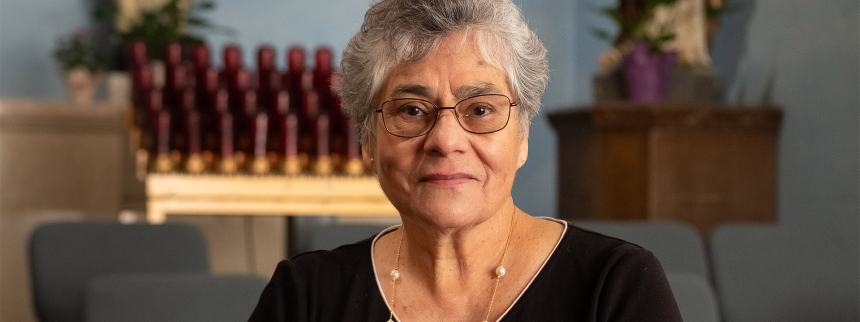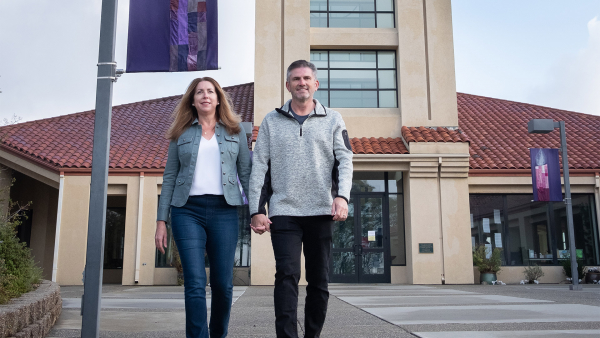
The United States Conference of Catholic Bishops (USCCB) reports that an estimated 20 percent of U.S. Catholics divorce at sometime in their lives and roughly a quarter of these petition for annulment. In petitioning they seek mercy and relief from the bond of failed marriage to be free to marry again in the Catholic Church, return to a full sacramental life (if already remarried), or live peacefully once again following a traumatic or abusive marriage. Is it possible to find mercy and healing in this way?
Here, Catholic Herald magazine shares two stories of individuals who journeyed through divorce and sought annulments. They found new, merciful lives in Christ.
Sylvina Frausto – Holy Rosary Parish, Woodland
Even today, 30 years after her divorce, Sylvina Frausto fights back tears as she relates the circumstances of her abusive marriage. Without plans to remarry, Sylvina wanted to be “free of that bond.”
“Why would I want to be bound to him in the Church?” she asks rhetorically, recounting memories of verbal, physical and sexual abuse. Embarrassed to tell her mother or brothers months after her marriage of the marital crisis from the beginning, she endured nearly eight years, thinking maybe he would change. “But I stayed,” she laments, still anguished by all that culminated in her 1990 divorce.
Two priests serving Holy Rosary Parish at different periods helped Sylvina to muster the strength to petition for an annulment.
“I decided to do it in 1993,” she recalls, having weathered the painful process of court battles for custody of her two children. “I cried and cried writing my summary,” she remembers of the written testimony she submitted to the Tribunal. No formal help existed at that time and Sylvina navigated through the process on her own.
“I wasn’t aware of anything,” she says of the process. She had no idea that it was going to be “lengthy and painful” amid the already dark days of struggle to raise her young children and pay bills.
Some relief came with her decree of invalidity but she admits, “I cannot tell you that I found healing right away.” In fact, over a decade later while attending a retreat, she points to a “second stage of healing.” She concedes the annulment “started” her healing, but it unfolded over time.
“It’s lifelong homework,” she suggests, describing the dialogue that played frequently in her mind. Then she came to the point of accepting, “thanks to His presence in my life, regardless of what happened, I have two beautiful children who I love and they love me, too.”
Sylvina recently retired after serving 25 years as the parish administrative assistant. She served as the parish advocate for others facing the annulment process. After her own experience with it, she volunteered to assist parishioners with their summaries and typing, and after being hired at Holy Rosary this became one of her duties. After more than 15 years of helping petitioners, she attended the 2016 diocesan parish advocate training to formalize her long-standing service and expertise. Her unique position gives her a helpful vantage point on the prospect of any healing derived from an annulment.
“I believe a petitioner can experience compassion from the first time he or she approaches a priest to ask about it, and in the way an advocate listens and communicates with the petitioner,” she offers candidly, obviously grateful for the priests that reached out to her in her suffering decades ago. Sylvina indicates that compassion can be the conduit to renewed faith, a return to the church and a greater appreciation for what it means to be released and free of the bond of a painful and broken marriage in one’s past.
With equal concern, Sylvina mentions an important caveat, stressing that “a weak case might not help much with the healing process.” Witnesses must have strong information to support what happened during the couple’s dating relationship and they must be able to identify problems and “red flags” before the wedding day.
Sylvina confides that if too much time transpires, “I have found it is more difficult to get strong witnesses.” Witnesses’ memories may fade and the result “could be upsetting and frustrating” for the petitioner. She concedes there can be further heartache for some petitioners when annulments are not granted.
Teresa and Dale Booth – Holy Trinity Parish, El Dorado Hills
About four years ago, Teresa and Dale’s worlds connected even though they lived 150 miles apart – Teresa in El Dorado Hills and Dale in San Jose. Both divorced, they had turned to the same dating website to potentially meet a compatible friend. They found each other.
“I was looking for a man who would join me in my Catholic faith journey and way of life,” Teresa explains. Having been granted her annulment three years prior for her 18-year marriage, Teresa knew well that if it were God’s will that she marries again, “it would be with Jesus at the center this time.”
Dale admits his troubled 29-year marriage to an atheist served as his catalyst to find a Christian woman with whom he could share his faith. Other friends’ healthy marriages inspired him, too, and he knew when he met Teresa that “what she was sharing with me in words was exactly the pull I was feeling in my heart and mind.” Within a few weeks this “pull” led Dale, unaffiliated with any faith practice, to buy a Bible and the Catechism and contact his local Catholic church in San Jose to inquire about the Rite of Christian Initiation of Adults (RCIA).
“I wasn’t sure how he would react,” Teresa says of her direct announcement that she would only consider marriage in the Catholic Church. “I had to put that front and center,” she defends, noting her purposeful commitment to be “ready” if remarriage was a part of God’s plan for her life.
Teresa spent five years co-leading Holy Trinity Parish’s outreach ministry for divorced Catholics (as featured in Catholic Herald magazine September/October 2017), experiencing her own healing along the way and preparing for the annulment process.
“I had heard that annulments can be long and painful – and yes, mine definitely was,” she acknowledges, although quickly adding “I had a good advocate to guide me through the process and eventually good things came of the painful process.”
She knew the Tribunal’s decision could go either way from the onset and she recognized a certain amount of humility and suffering would define this “deep dive of introspection.”
“It’s a cathartic process with the potential for much grace and healing no matter how they decide,” she assures.
As Dale engaged in the yearlong RCIA program preparing to enter the Catholic Church in full communion during the Easter Vigil 2018, he also petitioned for his annulment with the help of the priest at his San Jose parish. He was determined to “do things right this time.” He prepared for a long process and to his surprise, his annulment took considerably less time under the provisions of “lack of form.”
“We saw it as an invitation from God that we could move forward with our dating relationship and eventual engagement,” Dale says of his annulment, pleased to be “truly free of my first marriage.” Teresa and Dale married in May 2018.
“We all need God’s mercy and grace to help us do a good job being husbands and wives,” Teresa affirms with gratitude for their respective annulment journeys and confident the process “helped to make our priorities clear in life – Jesus and our Catholic faith.”
What’s missing?
The Diocese of Sacramento Tribunal staff studies petitions for annulment with a purpose to defend the bond of marriage while also offering healing and reconciliation if possible. Summaries and testimonies reveal the validity of a marriage or, conversely, whether something was missing that prevented a true marriage.
The United States Conference of Catholic Bishops’ (USCCB) webpage on annulment summarizes the necessary elements for a valid Catholic marriage:
- Both spouses are free to marry;
- Both are capable of giving their consent to marry;
- Both freely exchange their consent;
- In consenting to marry, both have the intention to marry for life, to be faithful to one another and be open to children;
- Both intend the good of each other; and
- Consent is given in the presence of two witnesses and before a properly authorized Church minister (exceptions to this must be approved by Church authority).
The Tribunal issues a Decree of Invalidity when it is proven that some ingredient necessary for a true marriage was lacking when consent was exchanged.
---
Learn More
If you or someone you know is thinking about an annulment, contact the Tribunal by phone at 916-733-0225, or email to TribunalDept@scd.org.
Resources, frequently-asked questions, and forms needed for the annulment process are available on the Diocese of Sacramento’s website at www.scd.org/tribunal/annulmentinformation-and-forms.
The first step in the annulment process in the Diocese of Sacramento is to contact your parish and ask to speak with a parish advocate (priest, deacon, or appointed lay minister). The advocate works with petitioners in gathering the paperwork and documents to submit to the Tribunal on behalf of the petitioner.
(Header photo: Sylvina Frausto recently retired after 25 years on the staff of Holy Rosary Parish, including being the parish advocate for others facing the annulment process.)


